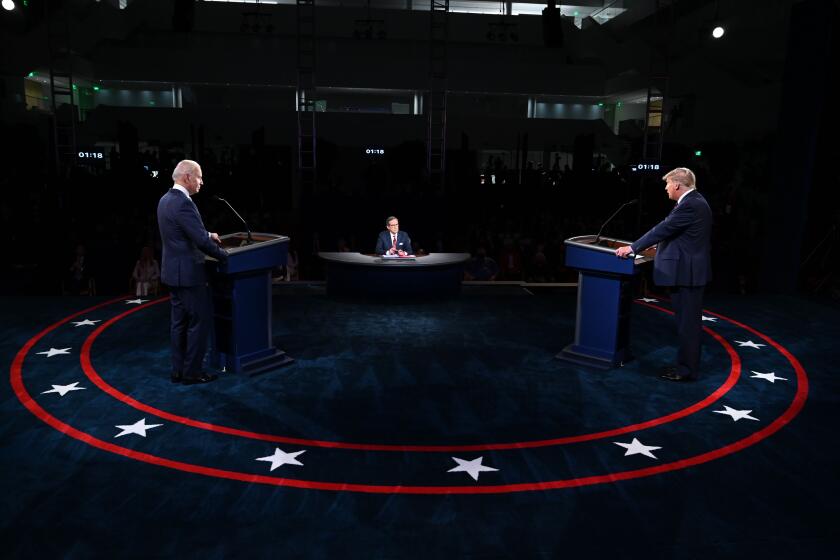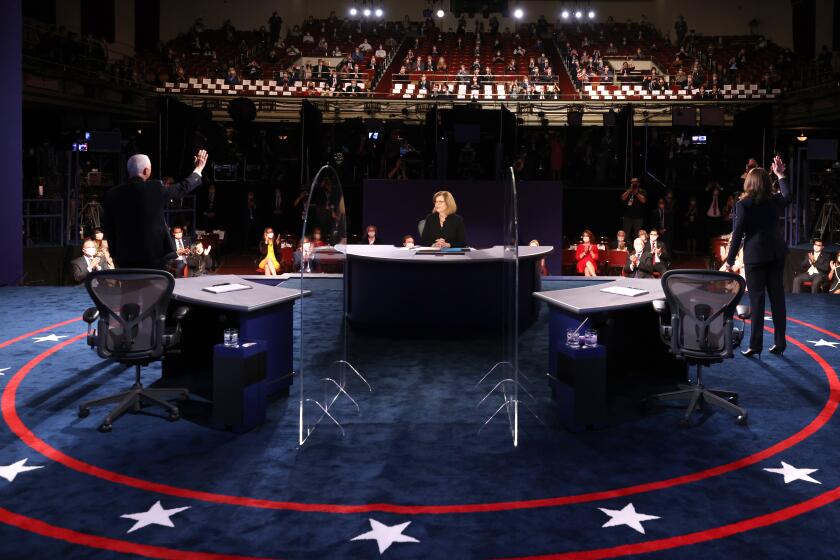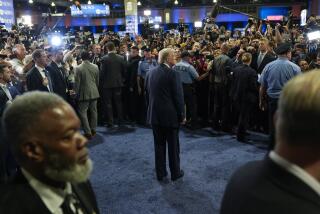Trump, Biden clash over format and timing of next presidential debates

President Trump rejects a virtual debate with former Vice President Joe Biden. His campaign says he’ll hold a rally instead.
WASHINGTON — Further presidential debates this fall were uncertain Thursday after President Trump rejected a virtual format next week to protect people from his COVID-19 illness and former Vice President Joe Biden refused to postpone the third debate until days before the election.
With election day less than a month away, the impasse could cost Trump a crucial last chance to close the gap with Biden, who surged in polls after the president’s vitriolic performance in their first debate last week.
But the president’s physician, Dr. Sean Conley, gave him a boost Thursday afternoon, saying that Trump could safely return “to public engagements” on Saturday, 10 days after he first tested positive for the coronavirus.
In a statement, Conley said Trump’s condition “has remained stable and devoid of any indications to suggest progression of illness.”
The next debate was scheduled for Oct. 15, but Trump was hospitalized for three nights with COVID-19 last weekend. The president has refused to isolate himself since returning to the White House, and his campaign said he would hold a rally rather than participate in a debate in which he and Biden were in different locations.
Trump’s resistance is an extension of his months-long disdain for coronavirus safety precautions, and the virus now has infected multiple officials in his White House and campaign. Senate Majority Leader Mitch McConnell (R-Ky.) said Thursday that he has refused to visit the White House since Aug. 6.
“I personally didn’t feel that they were approaching the protection from this illness in the same way that I thought was appropriate for the Senate,” which is to wear a mask and practice social distancing, McConnell said at an event in Kentucky.
The dispute over the two remaining presidential debates erupted Thursday morning when the nonprofit Commission on Presidential Debates announced that the Oct. 15 event would require the two candidates to speak remotely “in order to protect the health and safety of all involved.”
The moderator, C-SPAN’s Steve Scully, would host the town hall-style debate from Miami as voters posed questions to Trump and Biden, who would appear on screen from different locations, the commission said.
Trump swiftly rejected the plan.
“I’m not going to waste my time on a virtual debate. That’s not what debating is all about,” he told Maria Bartiromo on Fox Business. “You sit behind a computer and do a debate. It’s ridiculous.”
Trump’s allies revived baseless suggestions that Biden wanted to use a teleprompter or get assistance from advisors, and Trump’s aides said the president would hold a rally that night instead.
“We’ll pass on this sad excuse to bail out Joe Biden and do a rally instead,” said Bill Stepien, Trump’s campaign manager, who has tested positive for the coronavirus himself and is working remotely.
Stepien offered to postpone the town hall to Oct. 22 — when Trump would presumably not be contagious — as long as the third debate would be pushed back to Oct. 29, five days before election day.
Biden refused, saying he’d participate Oct. 22 but not after that.
“We set the dates. I’m sticking with the dates,” he told reporters while campaigning in Arizona. “I’m showing up. I’ll be there. In fact, if he shows up, fine. If he doesn’t show up, fine.”
President Trump and Joe Biden clash Tuesday night in their first face-to-face debate
With the Oct. 15 debate apparently scrubbed, Biden agreed to participate solo in a town hall event that night hosted by ABC News.
Trump’s campaign said the president would be healthy enough to participate in a debate in person that day, citing Conley’s letter. But the commission refused to budge and insisted that it would be held virtually if it takes place at all.
The president’s team is eager to make up for his ruinous first debate with Biden, on Sept. 29 in Cleveland. Public opinion surveys showed voters were repelled by Trump’s bullying demeanor as he repeatedly mocked and interrupted the former vice president.
It’s unusual for a candidate down in the polls — in this case, Trump — to turn down a nationally televised debate, and some Republican analysts believed Trump’s decision was unwise.
“If you believe he is behind, and I do, you need opportunities to change that,” said Scott Jennings, a Republican strategist and former McConnell advisor. “So from that perspective, it would be wise to have these debates whenever you can. The later you have them, the fewer people there are who are persuadable or even available to vote.”
Ed Rollins, a veteran Republican strategist who leads a super PAC that backs Trump’s reelection, said the president was better off hitting the campaign trail and focusing on a handful of battleground states that will determine the election, rather than a national audience.
“He’s got five or six states that are critical to him,” Rollins said. “He’d be much better off to barnstorm those states and try to move smaller numbers of votes.”
Besides, Rollins added, Trump is unlikely to modify the behavior that so many voters found unpleasant in the last debate.
Get our L.A. Times Politics newsletter
The latest news, analysis and insights from our politics teams from D.C. to Sacramento.
You may occasionally receive promotional content from the Los Angeles Times.
“It’s not his style to change,” he said. “He’s not going to go out and become soft and fuzzy.”
At least for now, attending a Trump rally could be risky. The president remains contagious, and many of his supporters refuse to wear masks or socially distance.
Although Trump returned to the Oval Office on Thursday for a second day, details about his health are spotty. The White House refused again Thursday to say when Trump last tested negative for the coronavirus, and a spokeswoman, Alyssa Farah, said his test results were “his private medical history.”
Trump announced early last Friday that he had tested positive for the coronavirus, and he was airlifted to Walter Reed National Military Medical Center that night for treatment for COVID-19.
Since returning from the hospital Monday, Trump’s decision-making has been erratic, even by his standards.
He abruptly canceled stimulus talks with House Democrats, ruling out the possibility of providing more financial relief to Americans struggling with the economic fallout from the coronavirus crisis.
Then, just as suddenly, he sought to restart the negotiations after a sell-off in the stock market. The talks have not resumed, and the likelihood of getting a deal before the election is slim.
House Speaker Nancy Pelosi (D-San Francisco) publicly questioned whether the drugs Trump is taking, especially dexamethasone — a steroid that can cause irritability and mood swings and give a false sense of extra energy — have impaired the president’s judgment.
“The president is, shall we say, in an altered state right now,” she told Bloomberg Television.
Farah, the White House spokeswoman, denied Pelosi’s charge. “Absolutely not. The president’s strong. He’s working. He’s never stopped,” she said.
Vice President Mike Pence and Sen. Kamala Harris will meet tonight for a 90-minute vice presidential debate, their only faceoff of the 2020 race.
Trump said on Fox Business that he’s feeling much better after his hospitalization but is still taking the steroid, which is prescribed for COVID-19 patients facing lung trouble.
Presidential debates have mostly been held in person, but it’s not unprecedented for candidates to speak from separate locations.
Richard Nixon spoke from a TV studio in Los Angeles, while John F. Kennedy appeared from another in New York, in their third debate in 1960; the moderator was in Chicago.
After Trump announced his positive diagnosis last week, Biden was tested repeatedly to ensure he had not contracted the coronavirus while onstage with the president. He tested negative each time, including Thursday, the campaign said.
Vice President Mike Pence and Sen. Kamala Harris — the running mates for Trump and Biden — also tested negative. But the commission placed plexiglass barriers onstage between them for the vice presidential debate Wednesday night, and they sat 12 feet apart.
Times staff writers Melanie Mason in Wilmington, Del., and Jennifer Haberkorn and Eli Stokols in Washington contributed to this report.
More to Read
Get the L.A. Times Politics newsletter
Deeply reported insights into legislation, politics and policy from Sacramento, Washington and beyond. In your inbox three times per week.
You may occasionally receive promotional content from the Los Angeles Times.














